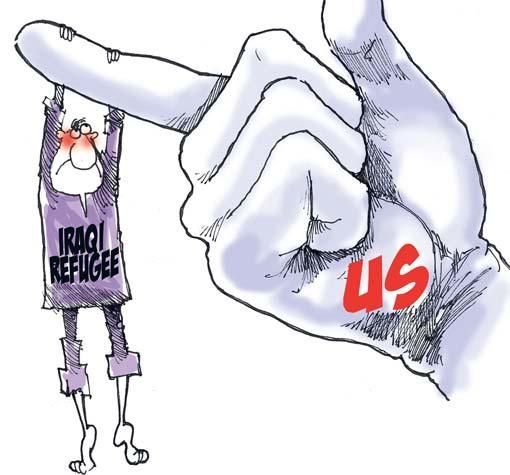Dumping the issue of Iraqi refugees on the lap of the United Nations may be one easy way for the US-led coalition to wash its hands of this humanitarian calamity, unmatched in the Arab world since the Palestinian nakba or disaster of 1948 as a consequence of the establishment of Israel.
To say the least, it does not speak highly of the Bush administration and its British counterpart to have taken a back seat while more than four million displaced Iraqis, half of whom are in neighbouring Syria and Jordan, try and make their ends meet.
A British parliamentary foreign affairs committee has this week rebuked the government for not "providing any financial support" in the last two years to the UN High Commissioner for Refugees (UNHCR) "to assist the plight of refugees" from Iraq.
It recommended that financial assistance be provided to Syria, now home to 1.5 million Iraqis, and Jordan where more than 750,000 have temporarily settled there.
The all-party committee insisted that future assistance "should be conditional on these countries keeping their borders open to Iraqi asylum seekers".
In the tradition of Arab hospitality, Syria is still receiving an average of 2,000 refugees a day, while Jordan is reportedly more selective. In turn, the Bush administration has not fared much better.
Its seemingly lackadaisical attitude has been the target of severe criticism, even from some legislators including Senator Ted Kennedy, Democrat of Massachusetts.
It has so far been primarily focusing on Iraqis who have worked, some as translators, for the US government or military in Iraq because, as explained by US Ambassador to Iraq Ryan Crocker, they are the targets of attacks by Iraqi militias.
Only 466 have been admitted but US Undersecretary of State Paul Dobriansky, who has recently led a task force on Iraqi refugees, has said the US would attempt to resettle in the US about 7,000 Iraqi refugees from countries where they are at present.
A senior State Department official, speaking on background, gave a somewhat brighter picture. He explained that the "total envelope" is about $150 million "for refugees outside the country and those displaced inside Iraq."
These US donations are being channelled through UNHCR and the International Red Cross. Another $14 million are given to non-government organisations that are working in Jordan, Syria and Lebanon and $10 million to help Jordanian schools which are accommodating Iraqi children,
The UNHCR and Unicef at the end of July have issued a new appeal for $129 million to meet the need for education among Iraqi youngsters. The American official stressed that "we expect to make a generous contribution as well."
When asked whether the US commitment is enough, the UN High Commissioner for Refugees, Antonio Guterres, told the press: "The dimension of the problem is so huge that nothing anytime is enough, but I think it's a good start."
Syrian Ambassador Emad Moustapha offered a much bleaker scenario.
A breakdown of Syrian expenses, submitted to the State Department and a copy of which was made available to me, revealed that the annual cost to the Syrian government "through subsidies for bread, heating oil, natural gas, gasoline, electrical power and water (is) approximately$1,877, 100,000."
The statement explained that the Syrian government pays "each year for registered Iraqi students, treatment of Iraqi patients at hospitals run by the Ministry of Higher Education, and bread approximately $830,533,844."
It added that this does not include the large expenditures made by the Syrian Ministry of Health for the treatment of Iraqi patients at public hospitals.
Besides the civil war now raging in Iraq and which has taken a heavy toll of American and Arab lives, unemployment or underemployment there has affected almost 50 per cent of the population, reported Anthony H. Cordesman, a respected strategist with the Centre for Strategic and International Studies in a 25-page report which The Washington Post has described as "absorbing".
He also cited US Department of Energy figures showing that Iraq is no longer oil wealthy: Iraqi oil exports earned in 1980 the equivalent of $55.3 billion but only $24.5 billion last year and a projected $22.9 billion this year, a decline of more than 50 per cent. Over the same period, he noted that Iraq's population has grown by 63 per cent.
The continued presence of the Iraqi refugees in Syria and Jordan, and in much smaller numbers in Saudi Arabia, Lebanon and Egypt, could pose serious problems for these host countries.
The US, because of its commanding role in Iraq, bears a major responsibility in shouldering the case of the hapless Iraqis, and more importantly in finding a quick resolution to the raging conflict in their homeland, so that they, unlike the unfortunate Palestinians, can return to their homeland forthwith.
George Hishmeh is a Washington-based columnist. He can be contacted at ghishmeh@gulfnews.com











